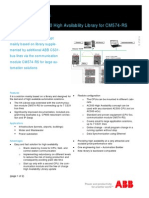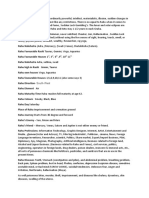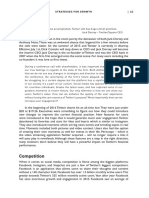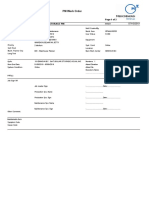Perceptions of Security
Uploaded by
Loraine Kytes BaliquiaPerceptions of Security
Uploaded by
Loraine Kytes BaliquiaPerceptions of security[edit]
Since it is not possible to know with precision the extent to which something is 'secure' (and a
measure of vulnerability is unavoidable), perceptions of security vary, often greatly. [3][17] For example,
a fear of death by earthquake is common in the United States (US), but slipping on the bathroom
floor kills more people;[17] and in France, the United Kingdom and the US there are far fewer deaths
caused by terrorism than there are women killed by their partners in the home. [18][19][20][21]
Another problem of perception is the common assumption that the mere presence of a security
system (such as armed forces, or antivirus software) implies security. For example, two computer
security programs installed on the same device can prevent each other from working properly, while
the user assumes that he or she benefits from twice the protection that only one program would
afford.
Security theater is a critical term for measures that change perceptions of security without
necessarily affecting security itself. For example, visual signs of security protections, such as a
home that advertises its alarm system, may deter an intruder, whether or not the system functions
properly. Similarly, the increased presence of military personnel on the streets of a city after
a terrorist attack may help to reassure the public, whether or not it diminishes the risk of further
attacks.
Certain concepts recur throughout different fields of security:
Access control - the selective restriction of access to a place or other resource.
Assurance - an expression of confidence that a security measure will perform as expected.
Authorization - the function of specifying access rights/privileges to resources related to
information security and computer security in general and to access control in particular.
Countermeasure - a means of preventing an act or system from having its intended effect.
Defense in depth - a school of thought holding that a wider range of security measures will
enhance security.
Exploit (noun) - a means of capitalizing on a vulnerability in a security system (usually a
cyber-security system).
Identity management - enables the right individuals to access the right resources at the right
times and for the right reasons.
Resilience - the degree to which a person, community, nation or system is able to resist
adverse external forces.
Risk - a possible event which could lead to damage, harm, or loss.
Security management - identification of an organization's assets (including people, buildings,
machines, systems and information assets), followed by the development, documentation, and
implementation of policies and procedures for protecting these assets.
Threat - a potential source of harm.
Vulnerability - the degree to which something may be changed (usually in an unwanted
manner) by external forces.
You might also like
- The Subtle Art of Not Giving a F*ck: A Counterintuitive Approach to Living a Good LifeFrom EverandThe Subtle Art of Not Giving a F*ck: A Counterintuitive Approach to Living a Good Life4/5 (6124)
- The Gifts of Imperfection: Let Go of Who You Think You're Supposed to Be and Embrace Who You AreFrom EverandThe Gifts of Imperfection: Let Go of Who You Think You're Supposed to Be and Embrace Who You Are4/5 (1148)
- Never Split the Difference: Negotiating As If Your Life Depended On ItFrom EverandNever Split the Difference: Negotiating As If Your Life Depended On It4.5/5 (933)
- Hidden Figures: The American Dream and the Untold Story of the Black Women Mathematicians Who Helped Win the Space RaceFrom EverandHidden Figures: The American Dream and the Untold Story of the Black Women Mathematicians Who Helped Win the Space Race4/5 (954)
- The Hard Thing About Hard Things: Building a Business When There Are No Easy AnswersFrom EverandThe Hard Thing About Hard Things: Building a Business When There Are No Easy Answers4.5/5 (361)
- The World Is Flat 3.0: A Brief History of the Twenty-first CenturyFrom EverandThe World Is Flat 3.0: A Brief History of the Twenty-first Century3.5/5 (2283)
- Devil in the Grove: Thurgood Marshall, the Groveland Boys, and the Dawn of a New AmericaFrom EverandDevil in the Grove: Thurgood Marshall, the Groveland Boys, and the Dawn of a New America4.5/5 (278)
- A Heartbreaking Work Of Staggering Genius: A Memoir Based on a True StoryFrom EverandA Heartbreaking Work Of Staggering Genius: A Memoir Based on a True Story3.5/5 (692)
- Security Is Freedom From, or Resilience AgainstNo ratings yetSecurity Is Freedom From, or Resilience Against3 pages
- Discussion: Drift Theory (Neutralization Theory)67% (3)Discussion: Drift Theory (Neutralization Theory)4 pages
- Edmund Spenser Philip Sidney: The Renaissance Literature (14 - 16 Century)No ratings yetEdmund Spenser Philip Sidney: The Renaissance Literature (14 - 16 Century)3 pages
- Leonardo Da Vinci Dominican Santa Maria Delle Grazie Milan Matthew Jesus Apostles EucharistNo ratings yetLeonardo Da Vinci Dominican Santa Maria Delle Grazie Milan Matthew Jesus Apostles Eucharist2 pages
- Philippine Manila University of Madrid: José Rizal, in Full José Protasio Rizal Mercado y Alonso Realonda, (Born June 19No ratings yetPhilippine Manila University of Madrid: José Rizal, in Full José Protasio Rizal Mercado y Alonso Realonda, (Born June 193 pages
- Pekaf: Arnis, As A Martial Art, Was Spawned in Philippine Soil. It Was Known in Ancient PhilippinesNo ratings yetPekaf: Arnis, As A Martial Art, Was Spawned in Philippine Soil. It Was Known in Ancient Philippines2 pages
- Saint Mary's University - Criminology Review Center: Subject: Traffic Management & Accident InvestigationNo ratings yetSaint Mary's University - Criminology Review Center: Subject: Traffic Management & Accident Investigation7 pages
- Works - Design.and - Management.2nd - Edition.jan.2009.ebook DDU100% (1)Works - Design.and - Management.2nd - Edition.jan.2009.ebook DDU522 pages
- AC500 High Availability Library For CM574-RSNo ratings yetAC500 High Availability Library For CM574-RS2 pages
- NCERT Solutions For Class 12th Microeconomics - Chapter 3 - Production and Costs - AglaSem SchoolsNo ratings yetNCERT Solutions For Class 12th Microeconomics - Chapter 3 - Production and Costs - AglaSem Schools12 pages
- Joining The Ties of Kinship - Islamic NetworkNo ratings yetJoining The Ties of Kinship - Islamic Network4 pages
- FINAL Work Experience Sheet - ENGR. FAROUK NINOY A. BASILANNo ratings yetFINAL Work Experience Sheet - ENGR. FAROUK NINOY A. BASILAN4 pages
- ALMCO Risk Assessment Kitchen & Dinning Area-JAN 2021No ratings yetALMCO Risk Assessment Kitchen & Dinning Area-JAN 202110 pages
- Concentration and Attention: Playful LearningNo ratings yetConcentration and Attention: Playful Learning21 pages
- Download Complete The adventures of an IT leader Austin PDF for All Chapters100% (1)Download Complete The adventures of an IT leader Austin PDF for All Chapters55 pages
- Research Methodology: Qudrattullah OmerkhelNo ratings yetResearch Methodology: Qudrattullah Omerkhel99 pages





















































































